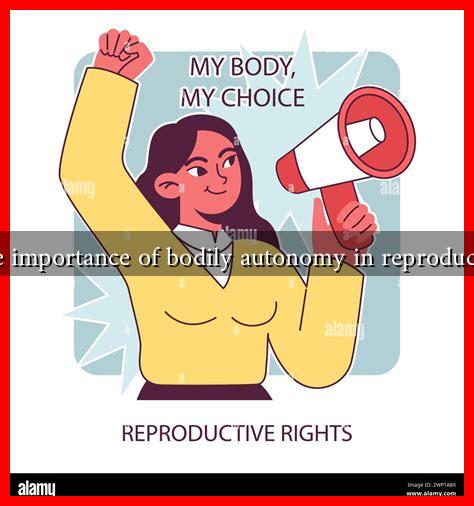-
Table of Contents
The Importance of Bodily Autonomy in Reproductive Rights
Bodily autonomy is a fundamental principle that asserts an individual’s right to govern what happens to their own body. In the context of reproductive rights, this concept is crucial as it encompasses the ability to make informed decisions about one’s reproductive health, including the right to access contraception, abortion, and maternal healthcare. This article explores the significance of bodily autonomy in reproductive rights, highlighting its implications for individual freedom, public health, and social justice.
Understanding Bodily Autonomy
Bodily autonomy refers to the right of individuals to make choices about their own bodies without external interference. This principle is rooted in human rights and is essential for personal dignity and freedom. In reproductive health, bodily autonomy allows individuals to:
- Decide whether and when to have children.
- Access safe and legal abortion services.
- Utilize contraceptive methods that suit their needs.
- Receive comprehensive sexual education and healthcare.
Without bodily autonomy, individuals may face coercion, discrimination, and violence, undermining their ability to make choices that affect their lives and futures.
The Link Between Bodily Autonomy and Reproductive Rights
Reproductive rights are inherently tied to the concept of bodily autonomy. When individuals are denied the right to make decisions about their reproductive health, it not only violates their autonomy but also has broader implications for society. Here are some key aspects of this connection:
- Empowerment: Bodily autonomy empowers individuals, particularly women, to take control of their reproductive choices. This empowerment is essential for achieving gender equality and social justice.
- Health Outcomes: Access to reproductive healthcare, including contraception and safe abortion, leads to better health outcomes. According to the World Health Organization (WHO), access to family planning services can reduce maternal mortality rates significantly.
- Economic Impact: When individuals can make informed choices about reproduction, they are more likely to pursue education and career opportunities, contributing to economic growth. A study by the Guttmacher Institute found that every dollar invested in family planning saves $3 in public costs for maternal and infant care.
Case Studies and Examples
Several countries have made significant strides in recognizing and protecting bodily autonomy in reproductive rights, while others have regressed. Here are a few notable examples:
- United States: The landmark Supreme Court case Roe v. Wade (1973) established a woman’s legal right to choose an abortion, affirming the importance of bodily autonomy. However, recent legislative changes in various states have sought to restrict this right, sparking nationwide debates about reproductive freedom.
- Argentina: In December 2020, Argentina legalized abortion up to 14 weeks of pregnancy, marking a significant victory for reproductive rights advocates. This change reflects a growing recognition of bodily autonomy and women’s rights in Latin America.
- Norway: Norway has one of the most progressive reproductive health policies, providing comprehensive access to contraception and abortion services. This approach has resulted in low maternal mortality rates and high levels of gender equality.
The Role of Education and Advocacy
Education and advocacy play crucial roles in promoting bodily autonomy and reproductive rights. Comprehensive sexual education can empower individuals with the knowledge they need to make informed choices. Advocacy organizations, such as Planned Parenthood and the Center for Reproductive Rights, work tirelessly to protect and expand access to reproductive healthcare.
Moreover, grassroots movements have been instrumental in raising awareness and pushing for policy changes. For instance, the #MeToo movement has highlighted the importance of consent and bodily autonomy, influencing discussions around reproductive rights.
Conclusion
Bodily autonomy is a cornerstone of reproductive rights, essential for individual freedom, public health, and social justice. Recognizing and protecting this principle allows individuals to make informed choices about their reproductive health, leading to better health outcomes and greater economic opportunities. As societies continue to grapple with issues surrounding reproductive rights, it is imperative to advocate for policies that uphold bodily autonomy and ensure that everyone has the right to make decisions about their own bodies.
In summary, the importance of bodily autonomy in reproductive rights cannot be overstated. It is a fundamental human right that empowers individuals, promotes health equity, and fosters social progress. As we move forward, it is crucial to continue advocating for these rights to ensure a just and equitable society for all.
For more information on reproductive rights and bodily autonomy, visit Planned Parenthood or the Center for Reproductive Rights.


